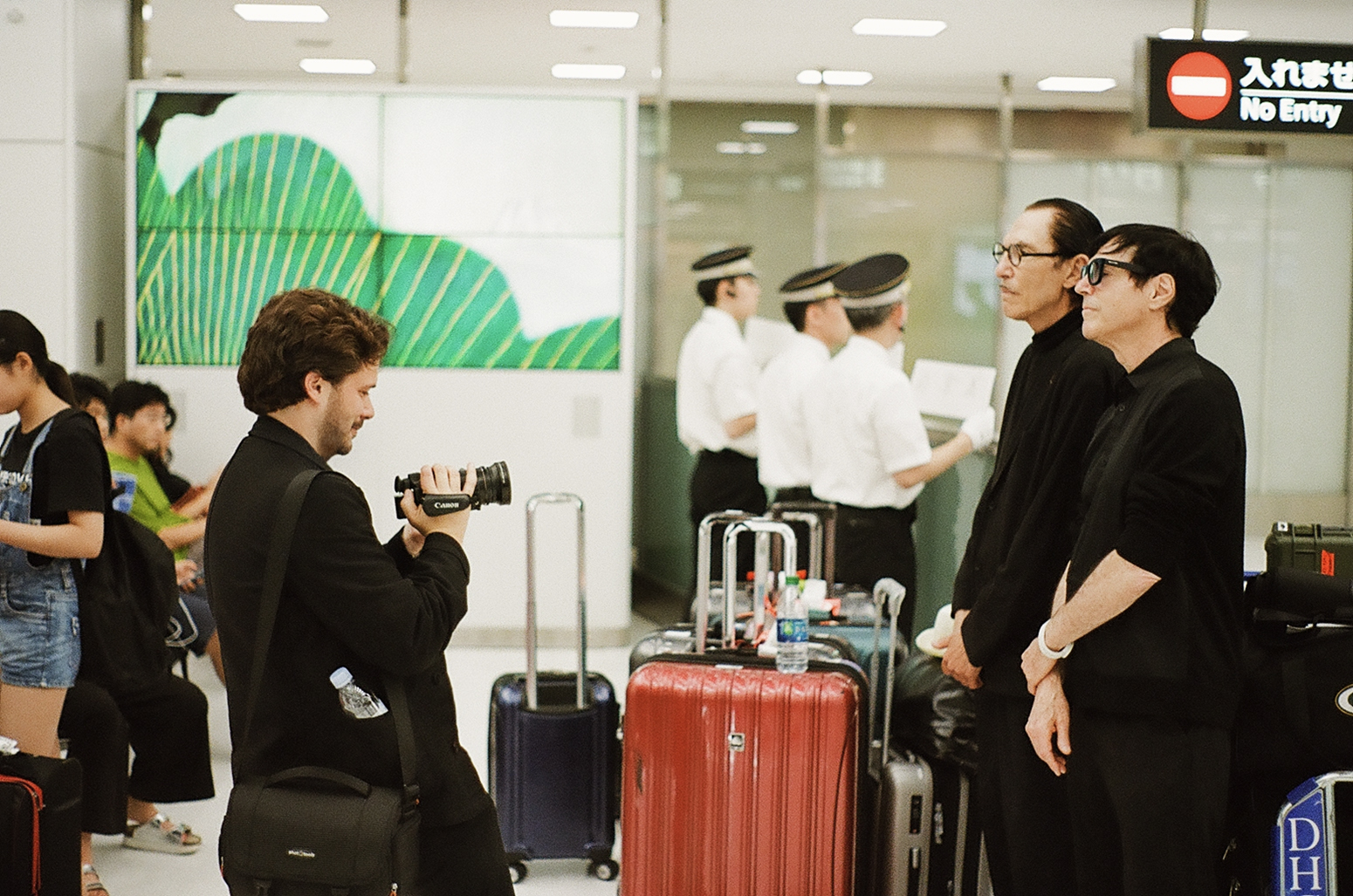Sparks get refreshed every decade and renewed with every generation. The art-pop duo is older brother Ron Mael—the one with the toothbrush mustache and the part-deranged/part-stern facial expressions—and younger brother Russell Mael, the dreamy one whose good looks morph right alongside changing times and styles.
The Los Angeles natives started formally doing music in 1967 and have since released 25 albums and upwards of 500 songs, some of them even hits. Forerunners in a number of musical innovations, Sparks did Queen before Queen, and Depeche Mode before Depeche Mode. They may not have received their full due at the time, but that hasn’t stopped the brothers from regularly releasing albums, somehow swerving away from becoming a legacy act while gaining new fans instead.
Now in their 70s, there is finally a Sparks documentary, The Sparks Brothers from Focus Features, directed by one of their firm “stans”: Edgar Wright. The film collects priceless archival Sparks footage and mixes it with animation and claymation to trace Sparks’ many twists and turns, giving a comprehensive view of them as people and as musicians.
Included among the talking heads confessing their devotion to Sparks are Todd Rundgren and Giorgio Moroder, both of whom produced albums for them, Jane Wiedlin of The Go-Go’s, Thurston Moore of Sonic Youth, Vince Clarke and Andy Bell of Erasure, “Weird Al" Yankovic, author Neil Gaiman, and Wright himself. These segments are shot in black-and-white with everyone getting into the swing of the humor. Wright takes a very literal, irreverent approach, so when the film says it’s painting a picture of Sparks, there is actually someone drawing them on canvas.
With The Sparks Brothers, Wright doesn’t so much close the books on Sparks as crack the world of the still-relevant duo wide open. It’s not an ending, or a nostalgic look back. Rather, the film brings awareness to their accomplishments, their talent, their resilience, and their unique place in music, past and present.
You can watch our conversation in the video above, or read through a transcript of the chat below.
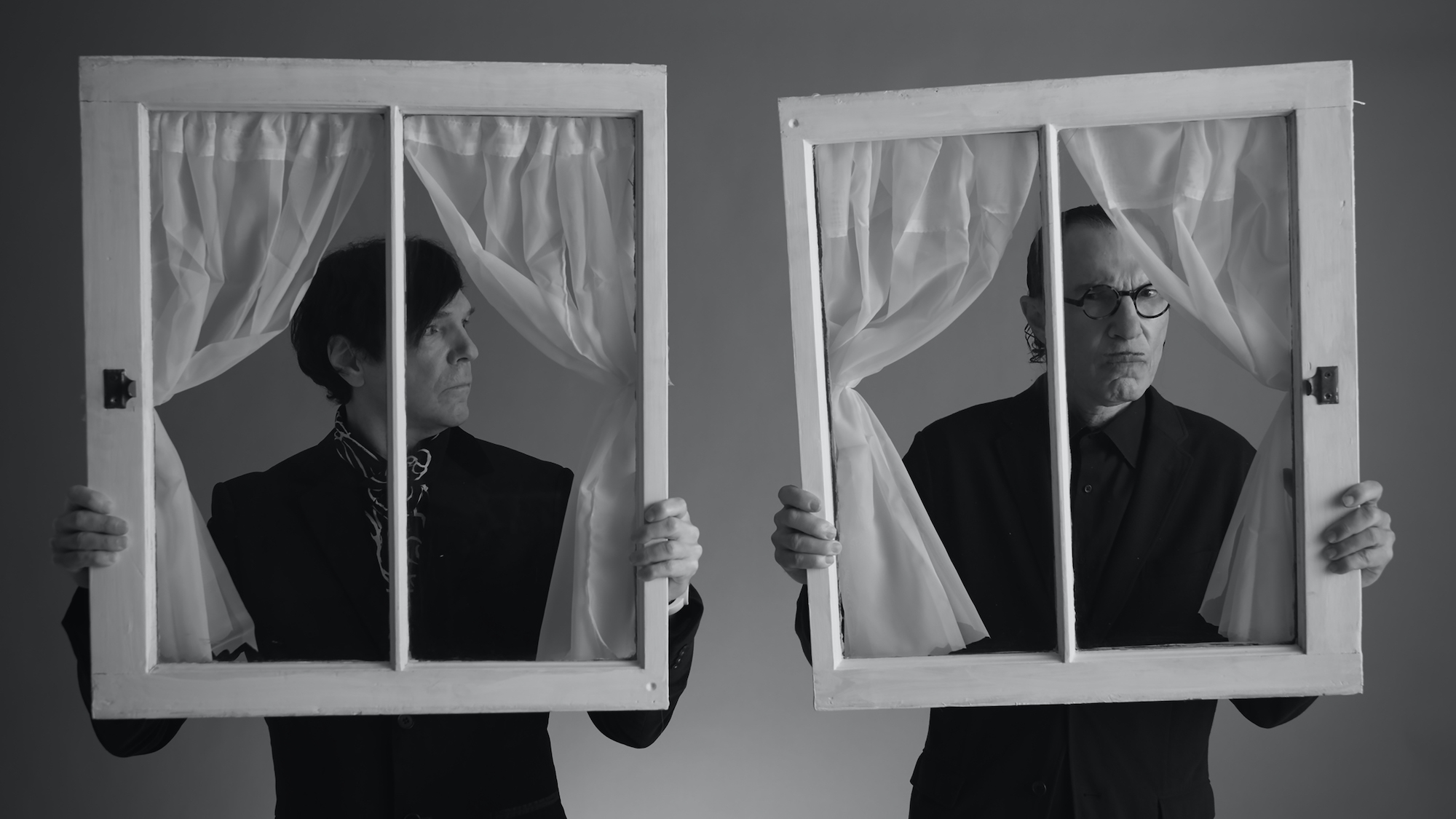
00001_SparksBrothers
Brothers Russell and Ron Mael from director Edgar Wright’s film THE SPARKS BROTHERS, a Focus Features release.
Credit: Jake Polonsky / Focus Features
How did this long-overdue documentary come about?
Russell: Happily, we were playing a show in Los Angeles and who should be in attendance but Edgar Wright. He had also been to a previous show of ours in LA. We got along really well. We feel a certain kinship with what he does cinematically. We love his films a lot. After the second show, probably a year after the initial one, Edgar said he’d really like to do a documentary on the band. We were just floored, thinking, “Wow, if we were ever to have a documentary about Sparks—despite past hesitations to do a documentary—this was the man, the director, and the opportunity.” Sometimes, in the past, we thought doing a documentary about yourselves maybe signifies an obituary in a certain sense that your past highlights are behind you and now it’s a subtle descent into the grave. Edgar really convinced us that he wanted to show that all of the eras that make up Sparks’ career were equally valid in their own and different ways, and it’s all led up to the present where we’re still being active and doing work that we all feel is really vital in the present time.
“Edgar really convinced us that he wanted to show that all of the eras that make up Sparks’ career were equally valid in their own and different ways, and it’s all led up to the present where we’re still being active and doing work that we all feel is really vital in the present time.” — Russell Mael
One of my favorite things about the documentary is how it maintains your sense of humor throughout the whole thing. There are so many interviews with so many people across the board, who all get into that Sparks sense of humor. What did you think when you saw how everyone got into that Sparks vibe?
Ron: I don’t think people necessarily shifted from who they were to our sensibility. Fortunately for us, the people that Edgar selected for the documentary share a certain way of looking at things—and even musically, there are musicians from all different styles, Sonic Youth and then Erasure, a wide swath. I don’t think people were like, “Oh we’re going to be in a Sparks documentary,” so they applied whatever that sensibility is. There is a connection because the people that like us tend to share a sensibility that we have that’s larger and specific to us.
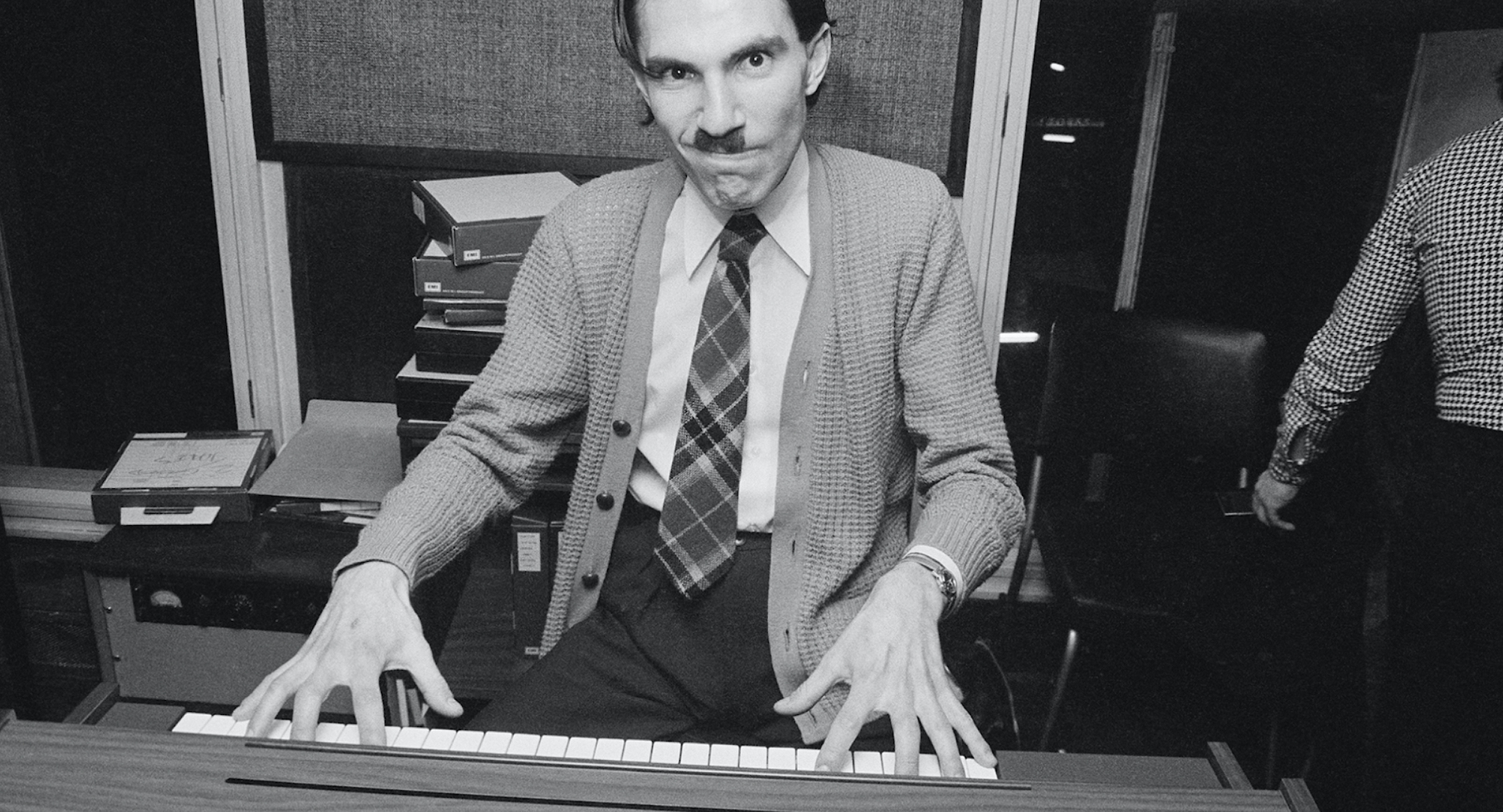
02988_FP_SPARKS
Archive photo of Ron Mael from director Edgar Wright’s film THE SPARKS BROTHERS, a Focus Features release.
Credit: Tony Visconti / Courtesy of Focus Features
How did you decide who to approach?
Edgar: The biggest challenge of the documentary was managing to pin everybody down. People who were in the documentary are all very busy themselves. The way I approached it was there were three categories: There were people who worked with Ron and Russell. They’d either been in Sparks or produced Sparks or been the manager. That was an obvious group of people to interview. Then there’s people who were noted fans who had been on record as being fans, Steve Jones from the Sex Pistols or Steve and Gillian from New Order, Thurston Moore, and many others. And then the third wild card category were people that I assumed were Sparks fans and asked them outright if they were. Four out of five times I was correct. As an example, I was at a party in Hollywood and Fred Armisen walked in and I said, “Hey, you like Sparks, right?” And he goes, “I love Sparks.” That’s pretty much how I found Fred Armisen, Beck, Flea, Mike Myers, Neil Gaiman. It was just asking the question outright and most of the time I was pleased but not surprised.
“I was at a party in Hollywood and Fred Armisen walked in and I said, ‘Hey, you like Sparks, right?’ And he goes, ‘I love Sparks.’ That’s pretty much how I found Fred Armisen, Beck, Flea, Mike Myers, Neil Gaiman. It was just asking the question outright and most of the time I was pleased but not surprised.” — Edgar Wright
This is your first documentary, how was your approach different than your scripted work?
Edgar: When I’m making a narrative film, I’m creating a story from scratch. With a documentary, there’s a story that exists and you have to figure out how to make that into a film. Sparks don’t have—and I think this is a good thing—they don’t have the trajectory of most bands because, in a way, most bands have the same rise and fall and rise again, and that’s why a lot of music documentaries feel kind of same-y, because they have the same three-act structure of life. Sparks have a much more interesting ECG machine version of that trajectory, which, to me, makes for an interesting documentary because there’s a series of left turns all the way through.
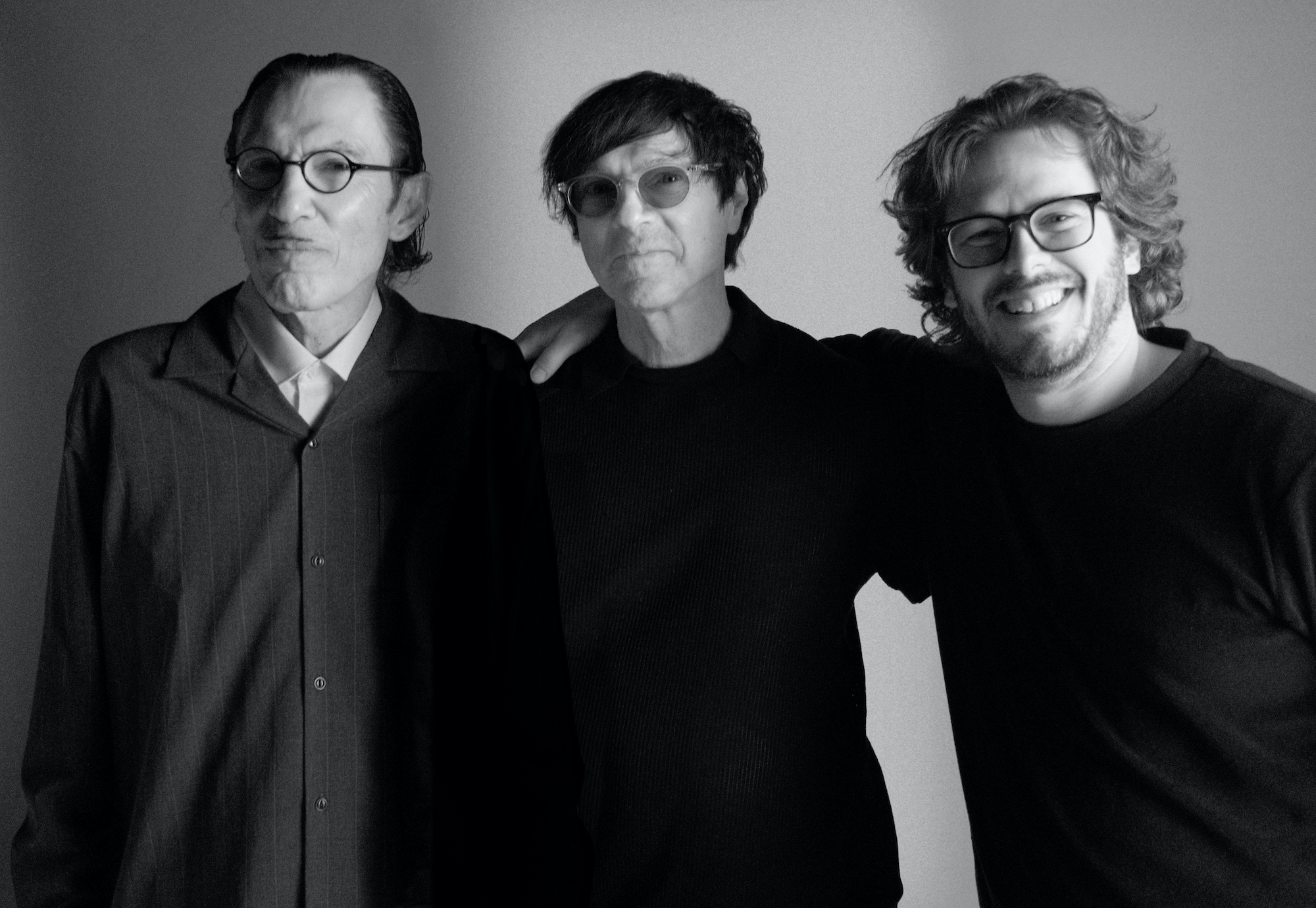
Edgar hero 1_PhotoByJakePolonsky
Brothers Ron and Russell Mael and director Edgar Wright from their film THE SPARKS BROTHERS, a Focus Features release.
Credit: Jake Polonsky / Focus Features
The Sparks archival footage and archival footage from that time blend together really well, and it really does have a narrative and an arc, which the best documentaries do.
Edgar: The use of archival footage mixed in with animation and also footage of the time, it seemed to wed itself to probably all of the influences that were in Ron’s and Russell’s head before they started Sparks. Right at the start of the documentary Ron talks about the fact that their dad used to take them to double bills at the cinema, but then go in halfway through one film and leave halfway through another one. That kind of bombardment of ideas that you would get from seeing lots of films like that, and also commercials in between, that stuff seemed to be in their DNA and the way that they approached music. And also, Ron and Russell, before Sparks, studied film and graphic design—that becomes very clear that that’s a big part of the band in terms of album covers, stage craft, videos, and it was a joy to continue that thread in the way that I shot the documentary.
Considering all the ups and downs of your career—some of the downs seriously down—did you ever consider quitting?
Russell: I don’t think it was ever an option. What would be the alternative? We have one thing that we think we’re good at doing. There’s isn’t another option to replace that. When times were bleaker, I think it forced us to regroup in a way, just to figure out what you can do to combat that and come up with more material that you feel is really strong, or a different kind of approach that you feel that you haven’t touched on yet that would be strong. I don’t think it’s ever been an option to not be doing what we’re doing. I think that’s one of the strengths of the band: it’s very single-minded what we’re doing and what the outcome should be.
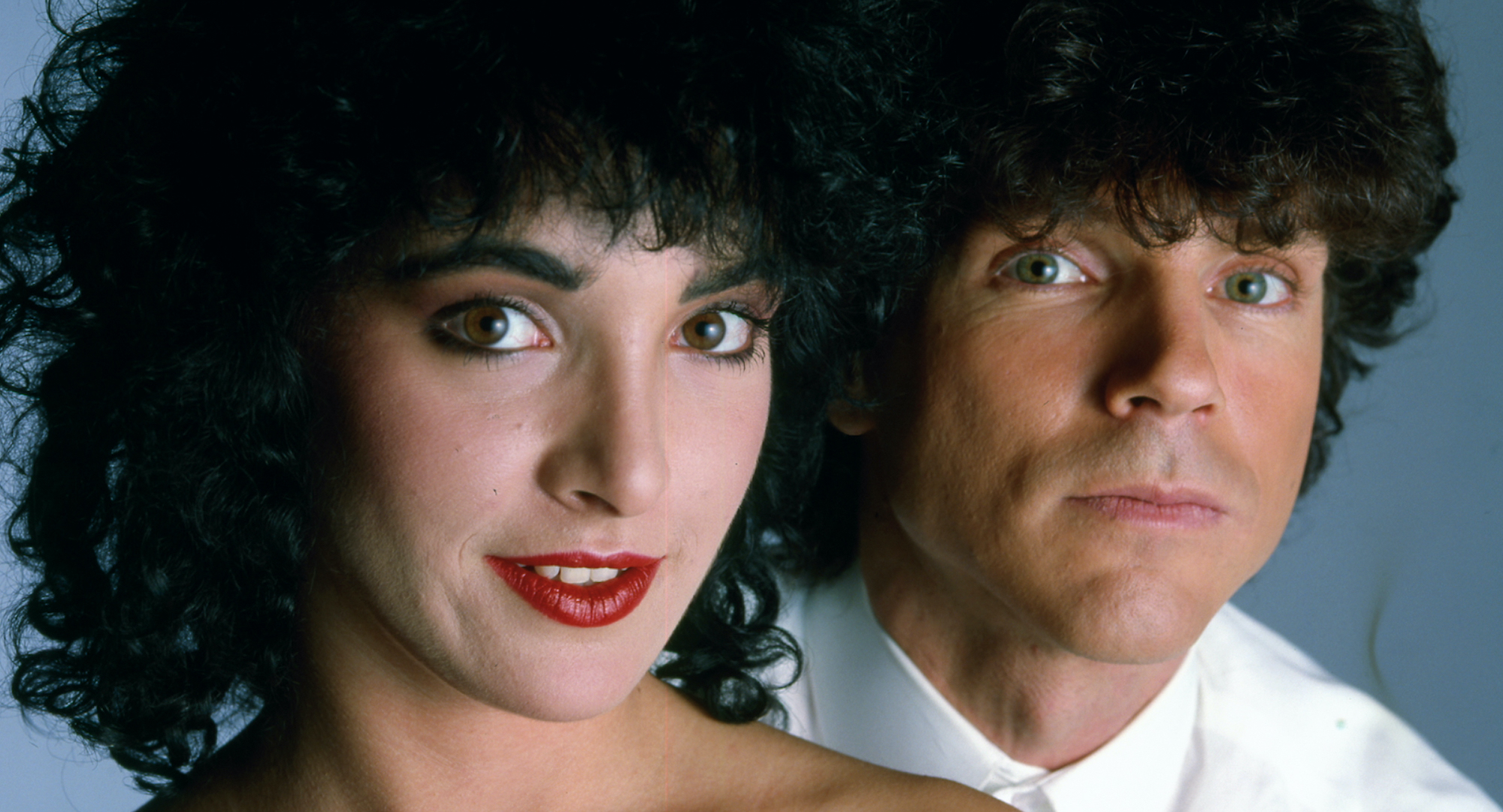
05222_FP_SPARKS
Archive photo of Jane Wiedlin and Russell Mael from director Edgar Wright’s film THE SPARKS BROTHERS, a Focus Features release.
Credit: Jim Shea / Courtesy of Focus Features
Ron: Sometimes what seems like a moment of inspiration is really from desperation where you make a musical change that seems calculated from one area and it’s actually because you had no choice. You had to do something separate from what you had done before.
“Sometimes what seems like a moment of inspiration is really from desperation, where you make a musical change that seems calculated from one area and it’s actually because you had no choice. You had to do something separate from what you had done before.” — Ron Mael
You have a lot coming up for people who are past retirement age for the average person, although musicians never retire. What can you tell us about that we can look forward to?
Russell: Beyond the documentary, which we’re just so thrilled about, Edgar looks like he was a visionary to touch upon a couple of film projects we had in the past and then all of a sudden, the outcome following the documentary, there’s two films out now and they happen to be at the same time. The other is a movie musical that we instigated about eight years ago called Annette. It’s a narrative story. It’s directed by the French director Leos Carax. It’s going to be premiering at the Cannes Film Festival, the opening night film of Cannes. It’s something that’s kind of been a dream of ours, to have a film not only get made, but to have it open at Cannes. There couldn’t be a better next step for the documentary leading up to from the end of the documentary, and Edgar touches upon it. When the musical was being filmed, they actually came to Brussels for some of the shoot of Annette to record that. Now it’s coming out at Cannes. Just for upcoming events, it couldn’t be a better one for us to have.
Ron: We had postponed two tours in the past year because of the pandemic, so we’re really thrilled to be able to be touring again starting February and March, both in the States and Europe and Scandinavia, and then hopefully in Asia after that. FL

